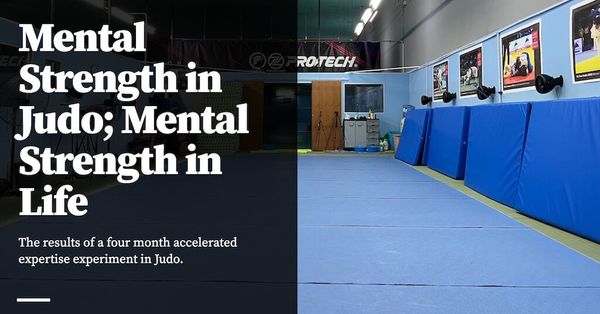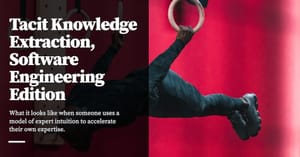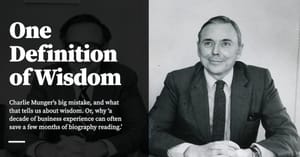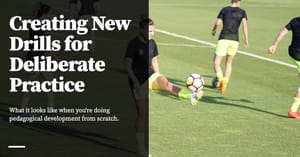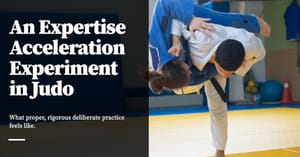This is a follow up to an earlier piece titled An Expertise Acceleration Experiment in Judo. You should read that before starting on this.
I’ve been struggling to write this essay for awhile now. How do you compress what feels like a year of life lessons into a single essay? I vanished for four months to do this Judo experiment, but the weird thing about sports is that a lot happens in a very short amount of time. (Also: time dilates when you’re in pain, though the pain I suffered was more mental than physical in nature — in the sense that nearly every lesson I learnt said a lot about me outside of Judo. About which, more in a bit.)
Here’s my best stab at telling that story.
I moved to Kuala Lumpur for my Judo experiment on the 1st of November, 2022. My wife joined me for about a month, before flying off to Vietnam, leaving me alone for much of the experience. The Malaysian Senior Nationals ended on the 11th of March, 2023, which marks about 116 days, give or take one week, where I trained five hours a day for every weekday of the week. I returned to ‘normal’ life in Singapore on the 27th of March; I’m writing this about one month later, in Vietnam, whilst visiting my wife’s family.
It feels like such a huge gulf between the two worlds. I remember walking back from one of my training sessions, after the Nationals was all over, and thinking to myself: “I guess, in the end, life is about doing hard things and overcoming them.” And of course it doesn’t seem so bad right now, sitting here in my comfortable perch in a Vietnamese cafe, but I remember what it felt like in the thick of it, and it was a kind of physical stress I’d not experienced in any other domain of my life.
On another night, on my way back from training, I told my coach that I could extrapolate what I’d gone through and sort of guess at what the highest level Judokas did, given that they trained full time. “You know how I did the Billy Roll during my first match (in the Nationals) and it failed?” I said, “All I could think in that moment was ‘shit, shit, shit I should’ve drilled that more’ ... so now when I see a Judoka pulling off a fake attack or a successful roll on the IJF tour, I —”
My coach smiled. “— you know what it took them to be able to do that in top level competition.”
“Yes,” I said, “And I know how big the gulf (of skill) is, between my level and theirs.”
My coach didn’t say anything. He knew what I was talking about. He had, after all, lived it. After placing 13th in his weight category in the 1993 World Championships, he spent a large chunk of his twenties training full-time, out of Camberley, in a campaign to qualify for the Olympics. His bid ultimately failed. After he ended his competition career, my coach returned to Malaysia and started a successful career in journalism. He told me that he could “look myself in the mirror and honestly say that I have no regrets in my Judo life.” — this seemed important to me. He’d actually lived that life of sacrifice; I’d only gotten a taste of it.
I didn’t win in the Senior Nationals, but I did come back a changed person.
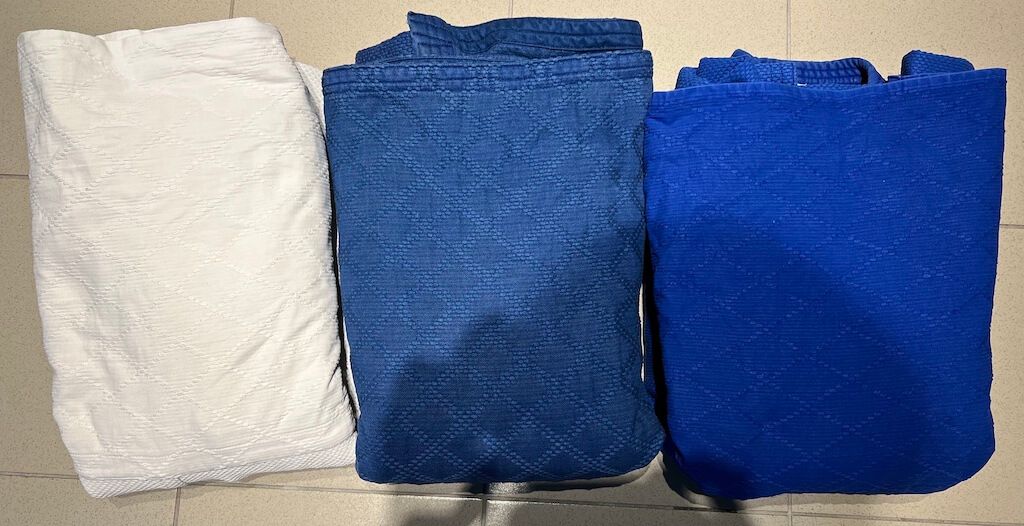
An Arc of Mostly Failure
I think the arc of my four month Judo experiment may be described like so: I started training in November, began deteriorating mentally over the course of the first two months, and then got hit in the head and asked for a break in early January 2023. Unbeknownst to me, this marked a turning point for my entire training stint. My coach realised that I had mental strength issues, something he had a blind spot over (he never experienced mental issues himself, as a competitor). But he realised that everything he was teaching me wasn’t working until he dealt with my mental weaknesses. And so he started doing mental strength training with me in late January, and things got better afterwards.
In many ways I really only experienced 1.5 months of proper training. In the final week before the competition, my coach took me aside and told me: “If I knew what I know now, I’d have trained you very, very differently. I would have given you mental strength training from the start. And I would have structured your training to work on your will issues.”
(I’ll explain what ‘will’ issues are in a bit; the concept is a little difficult to explain).
“Yeah,” I said, head down, “Looking back, my first two months here were wasted.”
“No, not wasted.” my coach said. “We wouldn’t have known about these issues if we hadn’t gone through those two months together. So you can’t say it’s wasted because it was necessary to learn these lessons. It was a journey of discovery — for both of us.”
As a direct consequence of my training challenges, my coach made the decision to move me down a weight category to -66kg, from my original category of -73kg. For context, I sit naturally at around 74kg if I work out regularly; I am 173cm tall. At the start of my training stint I was an overweight 80kg, the result of too much eating and not very much exercise in the months before the experiment started. But I had come down to 73kg by the time this conversation happened — about two months into my stint, shortly before the turning point around my mental issues.
I was, to put it mildly, very resistant to the idea of moving down a weight category.
“I’ve not been below 70kg since I was a teenager,” I told my coach. “I don’t want to go hungry.” I said. “I don’t want to deal with more things on top of all the stress that I’m currently experiencing.”
“Who said anything about going hungry?” My coach replied. “Look, we have more than two months before the competition. That’s plenty of time to lose weight. It’s easy to hit -66kg in a healthy way if you do this properly. And by properly I mean you will eat good, nutritious food, but the right kind of food. You’re not going to do something crazy like cut 5kg a few days before the competition. I, too, don’t believe in drastically cutting weight right before you fight.”
“Did you do a drastic cut before the World Championships?” I asked.
“No, I never drastically cut weight before any of my competitions. I just watched what I ate in the months before.”
“Don’t you think the risk of injury goes up if I go down to -66?” I said.
“No, most judo athletes your height on the IJF tour would be fighting at -66; the ones in -73 are usually bigger and stronger.”
I hemmed and hawed and gave a bunch of other excuses. I dragged my feet over the course of several days.
My coach eventually got right to the point. I was dodging the issue again one night when he cut me off: “You know what this sounds like to me? It sounds like you’re someone who likes food, and you don’t want to give up good food for what you want.”
“No, I —”
“Look, here are the facts. Do you want to win in the Nationals? I can’t guarantee you a win, but I can give you a shot. And, given your progress right now, I’m telling you, you do not have a shot at -73kg.”
He didn’t have to explain what he meant by that — we’d been working so closely by this point that I knew exactly what he was saying and why he was saying it. In Judo, it is possible to nullify a strength advantage with technique ... though what this means is very different from what an outsider might assume it means. A non-Judoka believes that Judo is an art where a smaller person may throw a bigger, stronger person; in reality this only applies in a situation where the skill difference is large. For two judoka with roughly the same throwing ability, nullifying a strength advantage means using grip fighting to deny your opponent a usable grip. No grip: no judo. My game plan was to use superior gripping to nullify whatever throws my opponent might have in their arsenal ... in order to win through other means. And this, in turn, was only possible because Malaysian judokas do not learn how to grip fight — local coaches here do not know how to teach it systematically. But my coach did. He taught a gripping system he had picked it up from competition centres in the West. The problem, of course, was that I was not improving fast enough at grip fighting to be able to execute that part of my game plan. I might have an easier time if I were dealing with weaker opponents, but I was not likely to survive if I was fighting against stronger opponents with equal (or superior) throwing skills at -73kg. Which I was.
“Ok,” I said, finally. “So what does losing weight properly look like?”
“Here’s what you’re going to do ...” My coach began, and then proceeded to describe my life for the subsequent two months.
The first issue was watching my caloric input. My coach gave me a list of detailed diet instructions, but eventually just said “ok, here are a bunch of meal plan companies, and assuming you’re willing to swallow the cost of buying these meal plans, you can take care of your main meals in one swoop.”
I did not mind, and so I signed up for a meal plan from a company called Yolofoods, based out of central Kuala Lumpur. I received 14 meals delivered to me once a week, for about 500kcal per meal. That in turn meant that I consumed 1000kcals a day. This is, to be clear, not a lot of calories.
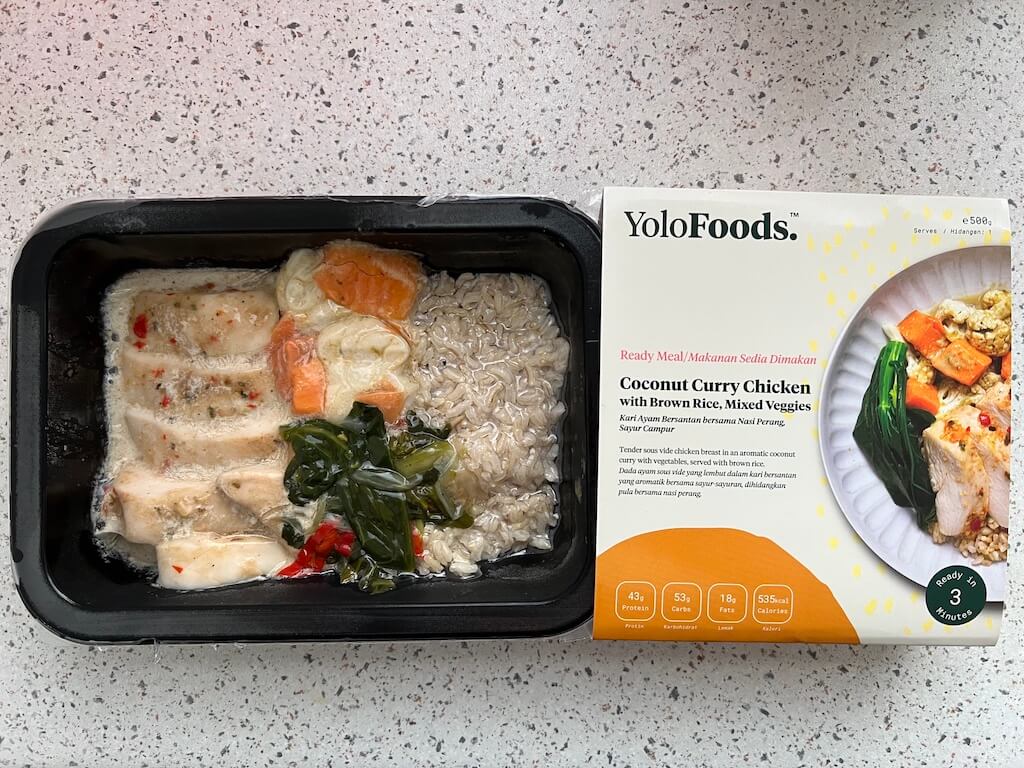
In addition to these meals, I was allowed to eat as much fruit and canned fish as I liked. I stocked up on apples, oranges, and sardines. And so my days would look like this: I would wake at 9am, eat two slices of wholemeal bread with peanut butter — my one gastronomical treat for the day, and the only meal that wasn’t strictly healthy. I would work from my Airbnb, napping if necessary, and eat lunch at 12 noon, and then a second meal — ostensibly my dinner — at 2:30pm. Then I would head out for training at 3pm, and train from 4pm in the afternoon, when the sun was still fairly high in the sky, to 9:30pm, leaving the dojo in the darkness of night. I don’t think I ever saw a sunset during those four months, at least not when training was on. I would eat two apples sometime around 7pm, in between training rounds, sweaty and hot in my judogi. And then, after getting home, I would eat two oranges, large Navel varietals, taking special care to never buy Valencias, cold and sweet and consumed straight from the fridge, and — occasionally, if I was hungry — a can of sardines, whilst waiting for my judogi to finish in the washing machine.
This diet continued for two months. The one saving grace was that I was allowed a cheat day once every seven days. I lived for those days. I would go to sleep some nights, nursing sore fingers or bruised shins or busted ears, dreaming of pizza, or burgers, or fried chicken, or fries.
There was one particular cheat day that I remember fondly. I woke up early and went to a nearby McDonald’s for lunch — and then I executed an order that I’d been planning for a few nights before: I ordered a quarter pounder, a filet-o-fish, a large side of fries, an upsized Milo (a malted chocolate beverage common in this part of the world), a McFlurry, and an apple pie, and I keyed in my order with zero hesitation, and ate it all in less than 15 minutes. I probably got a couple of stares, but I didn’t care. Saturdays were when we did two to three hours of intense competition drills, so this was my one chance at indulging before the stress started. I remember going to sleep that night extremely satisfied, despite getting banged up in training. I had zero desire to eat McDonalds for a few weeks afterwards.
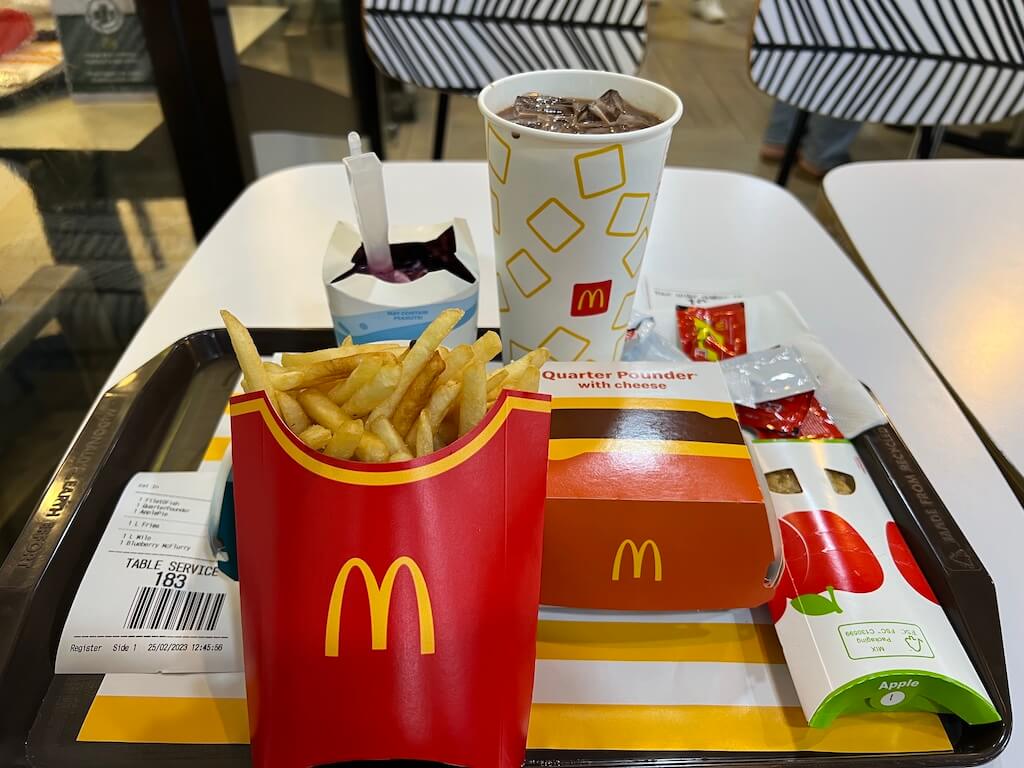
In the end, the weight cut worked exactly as my coach told me it would. I stepped on the scale during the official weight in at 63kg — arguably a bad outcome, as I’d overshot my weight loss goal and lost a great deal of muscle in the process. If I had to do it over again, I’d have consumed protein shakes and bought a weighing scale to track weight loss first thing every morning; I simply underestimated the caloric output of training five hours nearly every day. But I did not get injured, and the weight cut was not as big a deal to overcome as I thought it’d be.
The weight cut was not as big a deal to overcome as I thought it’d be.
I did not know this at the time, but my discomfort with the weight cut — really, the fact that I felt such resistance — lay at the heart of all my challenges with training.
Training was very stressful. It was stressful because I came into the four months knowing that I had to execute a specific game plan, one that my coach drew up in the weeks before the start of my training. The game plan was the only shot I had at winning. I explained in a prior essay that there are four ways to win in Judo: throw, pin, and submission (plus penalties). I was an older, less fit, less skilled judoka. The fitness was not that big of an issue (and indeed: I got quite fit over the course of four months). The problem was the skill. Throwing is an exceedingly difficult skill to learn. In Judo, it is widely known that ‘newaza (ground fighting) is easier to make progress in than tachiwaza (standup)’. As my coach put it — if you spend a year working on a particular newaza technique, be it choke, or arm bar, or pin, it is guaranteed that you will become a master of it by the end of one year. But you may spend years working on a throw and never get it to work. Throwing requires flair. Newaza does not. Winning by throwing was going to be too difficult in the short time I had. So: my game plan was not to throw.
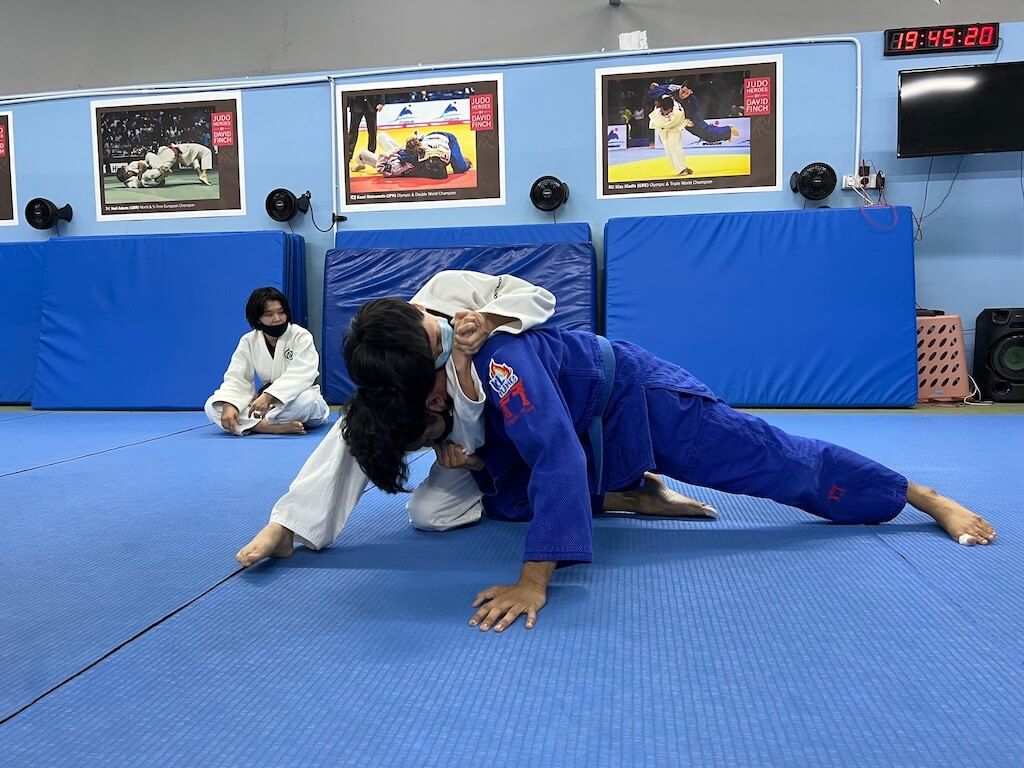
How then, to win? Clearly it would be to bring my opponent to the ground and win there. But here I can’t talk details, due to the nature of Judo competition in Malaysia. I bring this up only to explain what it meant for me: I had to disregard what little standup skill I had. I had to de-emphasise throwing in favour of tactical gripping. And I had to learn how bring my opponent, legally, to the ground. My coach’s primary goal was to help me build a workable ground game in the short time we had.
The problem was that I wasn’t making much progress — in all the components of my game plan. And this was why training was so stressful. I would fail at drills, often losing to people smaller and lighter — and therefore less physically strong — than me. It is one thing to lose to someone of roughly equal weight and strength, or to lose to someone larger and stronger. It is quite another to lose to someone two weight categories below me. And yet here I was, doing so, repeatedly, over the course of months. My coach couldn’t believe it. When I said that I was ‘deteriorating mentally’, this is what it looked like: I was able to throw people lighter than me in the initial weeks, but then, as time passed, my failure at drills bled over into my inability to throw my opponents, no matter who they were. It did not matter if they were smaller, or less skilled. I expected to lose, and so I did.
I’ve mentioned already that my coach started doing mental strength training with me in late January. This helped, though not nearly enough. Strange as it was, the single biggest thing that he did that made an immediate difference was to reorient me around my body language. “Your body language reflects your mental state,” he said, “You look like a wounded animal on the mats.” he told me. “You should use your body language as an indication of your thoughts. Bad body language, bad mental state,” he said, “I expect you to stay upright, to broadcast ‘come at me, let’s go’ when during randori (free sparring), to be eager for drills, to get up faster than your opponent when you’re thrown.” And then: “If you’re hurt, don’t show it. If you’re tired, don’t show it. If you’re hungry, nobody should know.”
This worked. Regulating my body language made a significant impact on the way I saw my training. To train me, my coach would yell whenever I let my body language slip. We have an exercise called the Golden Score drill, which simulates the unlimited time, sudden death contest that occurs if both players end the four minutes of regular match time in a draw. Golden Score is when the first player who scores any score wins the entire match. But it is just as important to not get a penalty during this period, as referees usually do not want Golden Score contests to stretch on forever. So the way you should imagine this drill is that both players have to constantly attack each other — and the way the drill feels is to imagine doing burpees for 8 seconds, resting for 3 seconds, and repeating this until one of you commits enough errors to rack up three penalties. I’ve lost count of the number of times my coach has yelled at me, during one of these drills: “CEDRIC, BODY LANGUAGE!” as I struggled to stay on my feet.
My coach also noticed that I dwelled on things, long after it was helpful to do so. For instance, I was making good progress on my ground defence, until one day a training partner turned me over and pinned me trivially with what we now call a ‘Fukuda roll’ — so named after 17 year old Yamato Fukuda, who used it to great effect in the 2023 Portugal Grand Prix. I was so fearful of this turnover that I exposed myself to choke and arm lock repeatedly over the next few weeks. “What are you doing?!” My coach said. “Is it better to lose from choke or arm lock instead of a pin?!”
“No,” I said.
“Then why are you letting him get wrist control?! Fear of a pin is no excuse! You have to stop EVERYTHING! When your opponent threatens you with a choke and gets a pin, you have to stop both. When your opponent threatens you with a pin and gets an armlock, you have to stop both! This is the nature of our sport: you have to walk and chew gum at the same time!”
And this repeated pep talk helped, like the body language trick helped, but they did not resolve my core difficulties. Looking back, I think my coach spent way more time puzzling over my problems than he let on — to me, it was just an endless set of drills, and an endless set of failures. Of course, the failures changed over time, as I improved, but progress was still slow.
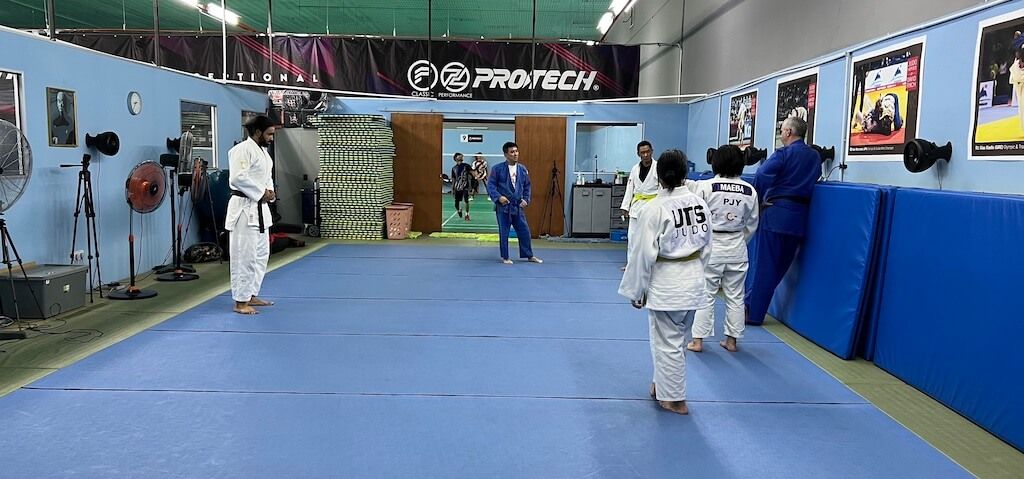
Things came to a head on the 6th of March, just five days before the competition. In Judo, the easiest way to escape a pin is often to entangle your attacker’s legs — that is, to wrap your legs around one of your opponent’s. One major issue that I had was that I did not do this. Consciously I knew that it was important; looking back in my youth I was quite sure that I instinctively entangled the leg as a teenage competitor, but as an adult today, I simply did not do so, even when my opponent’s leg was there for the taking.
At one point during drills on the 6th, after repeatedly telling me to entangle the leg over the course of a week, my coach finally lost his temper. He chewed me out, non stop, for a straight 15 minutes, in front of the other competitors. I remember this almost like an out-of-body experience, thinking, absurdly, “holy hell, I am a grown ass man, getting a proper chewing out, in front of teenagers, what the hell is wrong with me?!” But it worked: I entangled the legs of my opponents in drills and in sparring and in competitions forever afterwards.
At the end of training that day, my coach took me out to dinner, like he did on weekday nights (he ate and I watched, mostly), and he told me, gently: “I think I’ve figured out what explains all of your problems. And it means that I’ve been training you all wrong.”
“How do you mean?” I asked.
“Do you remember, when you first came to KL, what you told me? What your very first misconception was?”
“Yes,” I said, “I said that I didn’t have any talent. That I might not be good enough because I had no talent. But we’ve gone through this already — you’ve explained to me that talent matters relatively little in Judo, what matters is training and attitude, and I agree with you ...”
“Yes, yes, never mind that,” he said, waving me away. “But have you ever considered, what’s the assumption that someone makes if they say they have no talent?”
I kept quiet.
“It means that they think their problem is technical. They believe they do not have the skills.”
“Oh,” I said.
“And so I thought that your problem was technical! I trained you as if your problem was technical. But it wasn’t! No matter what I taught you, you didn’t seem to improve. Your problem is a matter of will, not a matter of skill. I taught you everything you needed to know in the first two months, but you just didn’t seem to apply it! You were not willing to apply it.”
I kept quiet, so he continued. “And so I think here’s what happened. You think that your problem is technical, so you kept telling yourself ‘oh, I can’t do the seoi overshoot, or I can’t outgrip A, or I lost to J because they know more than me, or they have more skills than me.’ But that is not true. You are giving yourself excuses! Do you think that when A is thrown by you or pinned by you, he thinks ‘oh, Cedric beat me because he’s more skilful or he’s stronger?’ I can bet you my last dollar that he doesn’t! I guarantee you he’s thinking something like ‘goddammit, he got me that one time, but I’m never letting him get me that way again!’ But you do not. You do not think like this, do you?”
“No,” I said, numbly. Everything he was saying felt true, and everything he said felt like a punch to the gut. I was guilty of these accusations. I gave myself excuses during drills and during technical sessions. I didn’t apply myself because I always thought, at the back of my head, that there was going to be something else that I needed to learn, a new technique, or a new insight, in order to do win the next time. But there wasn’t. There wasn’t anything more that my training partners knew that I didn’t. There was no secret. I was just giving myself ... an out.
There was a pregnant pause. Eventually I said, “Everything you say rings true to me.” and my coach said, “Good”. And then, after another pause, during which my coach ordered his dinner and I ordered a drink: “The good news is that you know everything you need to know technically. You just have to apply it.”
The Senior Nationals
I wish I could tell you that this conversation made a world of difference. And actually it did ... a little. After I stopped giving myself such excuses, I found that I improved faster during training. I found myself repeating “it’s a matter of will, not a matter of skill” like a mantra, under my breath, during drills and in bouts of sparring. But again, the discussion came up on the 6th of March, only five days before the competition, and there was simply not enough time for it to make a difference.
As my coach put it to me: “If I’d known what I know now, I would’ve trained you very differently.” He said this one day before we left for the Senior Nationals.
Judo matches are typically four minute affairs. Sometime around the 1.5 minute mark of my first match in the Nationals my opponent dug a fingernail into my face and tore a deep gash above my left eye. The referee was the first to spot it. I got up, at first confused because there was a lot of blood below me, and then I realised that there was a constant flow of crimson down my front, onto the mats. This was, to be clear, a superficial injury. I didn’t feel any pain; I knew there was nothing to worry about. The referee gestured for me to get medical attention. On the side of the contest area, a medic wrapped a cloth bandage around my forehead, taking care not to cover my eyes. I stepped back into the match, started with an exchange ... and was almost immediately told to go back to the medics. I was bleeding again.
This time the head ref came down to take a look. “Just so you know, if you bleed three times from the same wound, we’ll disqualify you.”
The medic tutted as she unwrapped my (now red) bandage — “I don’t think a bandage would help,” she said, “You’ll need stitches.”
I knew that getting stitches would mean an instant disqualification. “Wrap over the eye.” I said.
“You sure?” she said. “Yes,” I said. The team redid the bandages.
I returned to the mats with one eye completely taped over. I was not prepared for this situation. I remember looking out at my opponent, attempting to open my left (taped over) eye and feeling that everything was a sort of a blur. (Later I discovered that my soft contact lens had crumpled up in that eye). And then everything was a blur.
My opponent and I ended the four minute match time in a draw, with one score each. But then I could not throw him. I could not pin him. And he could not throw me. I don’t fully remember the details of the match, because everything was a mess of noise and colour. We entered Golden Score, and Golden Score stretched on like I’d fallen into some horrible, dilated time bubble. I felt like death. At some point in the match — I’m not sure when exactly, perhaps the 5th minute, or the 8th? — I realised that my limbs were too tired to engineer a turnover. Which meant that my game plan was shot. And a few moments after that, my coach, who was yelling at me from his matside seat, told me to switch strategies: I was going to engineer three penalties instead.
He didn’t tell me this explicitly of course; what he said was “CEDRIC. BODY LANGUAGE. LOOK AT HIM! BODY LANGUAGE! HE’S TIRED. YOU KNOW WHAT TO DO.”
I looked at him — a man-shaped blob at the side of the mats, and then I looked at my opponent — a man-shaped blob ... on the ground. My opponent was exhausted, lying spreadeagled and struggling to get up after each exchange. He had clearly never received body language training. I was equally dead on the inside, but I was doing my best to hide it, and I thought: “ok, I can do this.” And then I did what my coach told me to do, yelling veiled instructions in between exchanges: I engineered three penalties — exactly as we’d trained — and won.
After the match I learnt that we had fought for 11 minutes on the game clock; 16 minutes with all the stoppages. I had two immediate thoughts: the first one being ‘not bad for an old fogey.’ (A Judo match feels like high intensity interval training, so an 11 minute match is basically 11 minutes of HIIT.) My second thought was: “Shit. There are at least two matches left.”
At about the same time I realised I was still exhausted.
My coach did a debrief with me, and then I did warmups with one of my training partners. This was when I started to go on tilt. We did a gripping drill, and I realised that I had lost depth perception — I couldn’t grab my training partner’s arm before it got to me. I became scared. I tried slowing my heart rate with a box breathing exercise, but it didn’t seem to work. My coach tried to calm me down, but he wasn’t particularly good at this — how could he, when he had never felt fear before a competition? “You can do this, you can win this.” he said, but I couldn’t hear him, it felt like I was locked inside myself.
I lost my next two matches within seconds. In the first one I got thrown. In the second one I got foot swept, and then I was choked. I was scared, and everyone could tell.
The Aftermath
I’m not going to lie: this was an embarrassing result. In Judo terms, having an eye taped over is normal. The fact that I went on tilt was unacceptable. Masashi Ebinuma won the finals of 2013 World Championships by throwing his opponent, during Golden Score, after his opponent broke his arm with an illegal attack. [1] Yasuhiro Yamashita won the 1984 Olympic title with a torn calf muscle. Tadahiro Nomura won his third Olympic gold medal by engineering penalties in the finals, with a bruised rib. In comparison, I had a superficial cut above my left eye. Sure, I lost depth perception, but neither things are huge problems that I could not have overcome. I simply did not recover enough to think rationally: “ok, now that I’ve lost depth perception, now that I’m really tired, what can I do to win?”
My coach was honest with me after the Nationals. Some time after the competition — I can’t remember when exactly — we talked about my fear: “I wouldn’t have been affected if I lost one eye, you know.” he said, gently. “In the World Championships, I went up against the reigning Olympic champion in the second round. I can tell you in all honesty that I was not afraid. I even allowed myself the possibility that I had a 1% or a 0.5% chance of beating him. Of course, I got thrown. But I wasn’t defeated before I stepped onto the mats. You would have been, I think.”
“Yes,” I said.
We both agreed that the way I failed was consistent with all the things I’d learnt about myself during this four months. And here he said something that he’d always say to me after giving me painful feedback: “The thing you must remember is that we are humans. We are not dumb animals. Unlike animals, we can change our nature. So it is good that you’ve learnt these things about yourself. Now you can change.”
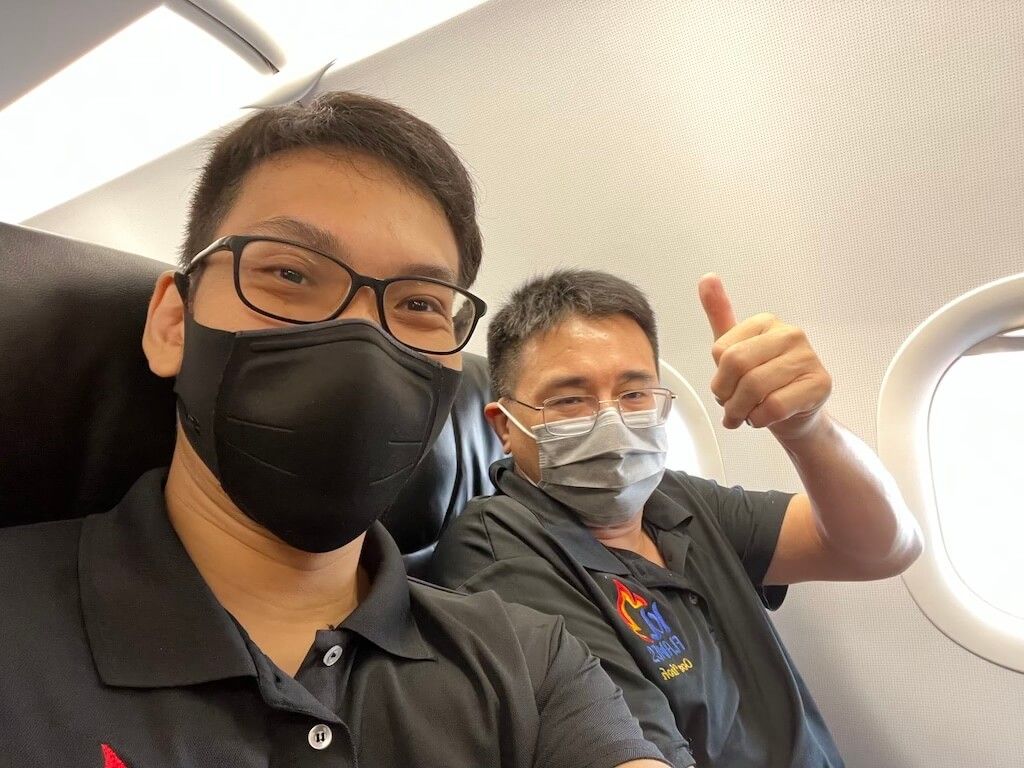
Some Lessons
I’ve spent some time thinking through my experiences, trying to work out what lessons I should draw from the whole thing. I’ve written a fair amount on this blog about not drawing lessons prematurely from one’s experiences ... so I’m not 100% sure that these are the right lessons. But here’s what I’ve worked out so far.
There’s a belief in Judo that “who you are on the mats is who you are off the mats.” The belief is likely as old as the sport itself, and stems partially from the fact that Judo was originally designed as a form of moral and physical education, not a competitive combat sport. My pet theory for why Judo reflects one’s true self, though, is that at the end of the day Judo is a fight, and fighting is personal and human and revealing in ways that most other sports are not. But perhaps I am mistaken; perhaps this is true for other sports, and perhaps even more so for other combat sports, but I bring this up because I believe it to be true; all the coaches I’ve had over the years believe it to be true, and it’s made everything so much harder.
It has meant, for instance, that nearly every failing that I have, every flaw that my coach uncovered, mirrored some real world analog. I would sit at my Airbnb dinner table and eat my oranges and write in my training log: “Sensei Oon said I have such-and-such a problem. Now what does it mean for me, outside of Judo?” I saw my weaknesses in Judo as reflective of my nature in business and in life. “Competition training is so hard,” I said, once, before a session, “It crushes you —” and my coach retorted: “Well, life is hard! Life will crush you! Better to learn who you are in competition training, rather than in life!” And that exchange has stuck with me.
What do I mean by my personal weaknesses?
Here is one example: earlier I said that I was not comfortable moving down a weight category. I put up a level of resistance than even I couldn’t explain. Why did I put up such resistance? For that matter, why did I struggle with entangling my opponent’s legs? In nearly all cases my challenges were that I could consciously accept the benefit of doing a thing, but when pushed to actually do the thing, I would put up an internal fight.
In the end, my coach figured it out the most likely reason for my problems: around the same time as our ‘will’ conversation, he pointed out that my unwillingness to entangle my opponent’s legs, my discomfort with the weight category switch, my problems with fighting a different style of Judo (in order to execute the game plan), and my inability to get my fake attacks to work — all of these stemmed from my nature: I was simply not comfortable with discomfort. I liked doing the same things over and over again. This — compounded with giving myself excuses on my lack of technical skill — resulted in what my coach termed my ‘will issues’. It was also broadly true outside of Judo: I liked picking the same restaurants, eating the same food, and working out of the same cafes. I did not realise it, but I had organised my life so that I never needed to leave my comfort zone. In Judo, this manifested in a strong subconscious resistance against anything that was fundamentally uncomfortable. And my coach found this frustrating. Hell, I found this frustrating. We could both see that whatever I was doing wasn’t working ... but I didn’t seem to be doing anything to change in response to failure.
How did this trait show up in my approach to business? I came to realise that everything impressive that I have ever accomplished in business was due to someone pushing me off a ledge. When I built the point-of-sales company, my old boss was the one who said “ok, we’re tackling restaurants” and I groaned publicly and complained bitterly and said that it would result in many all-nighters, and many botched deployments, and multiple customers yelling at us, and we haven’t even fixed the problems with our prior products so why were we tackling a new market segment, and indeed all of that came true ... but we figured out how to tame the business chaos anyway, and six months later we were in a markedly different, better place. Two years ago I helped a SaaS business double their annual recurring revenue, but it took over a year of lack-lustre, unhappy results, and the prodding of the company’s CTO before I proposed something new. Left to my own devices, I would have happily settled into a routine, making tiny adjustments to my beautiful, predictable process, never really taking large enough bets to improve our lot.
This was painful to admit. Sitting in that small Airbnb kitchen, eating those oranges, I held on to this self-image that I was a decently competent business operator. But then I realised that I never made big bets, even when justified. I was simply too uncomfortable with the chaos from such large moves. So to some degree it was true that I was decently competent — I could be dropped into a business problem and come up with some kind of path to get to our goals. But what I was learning was that I had to be given those goals; I had to be pushed off the ledge by a boss or a colleague. I would not, by myself, take the plunge.
If you had told me a year ago that I would be purchasing a deck of cards on discomfort as a result of a Judo experiment, I would have called you crazy. But as a rather unexpected side effect of my four months, I now have a greater interest in and appreciation for Vaughn Tan’s work on uncertainty. To be clear: many of us are uncomfortable with uncertainty, but I think the trait that is problematic here is that I am very uncomfortable with seeking out uncertainty. And whilst seeking out uncertainty might not be necessary for success in investing or in broader life, I suspect it is necessary if you want to be good at business.
Are there other lessons? Yes. Some of them are personally meaningful to me but boring, like how I have this tendency to let my mind drift — even during Judo — and how it was made clear to me that I am slow whenever that happens. (“Do the dishes faster,” as my wife would put it). Another thing that I learnt was the concept of ‘work capacity’, which explains both my initial performance degradation, as well as the arc of improvement you should expect to see in any serious physical training program. (Special thanks to Ammar Mian for the email that led to this. The short of it: what differentiates professional athletes from amateurs is that the pros train way harder, for longer, at a more regular frequency. This sounds obvious, so let me restate it in a way that will force you to re-examine your priors: ‘rest days are for amateurs’.)
In the end, though, I’m still trying to figure out the split between ‘weakness’ and ‘trait’. Even if we accept that who I am on the mats reflects who I am outside, it is not clear that all of my Judo weaknesses are weaknesses in other domains. In a conversation after my experiment concluded, my friend (and former NCAA gymnast) Jason Shen pointed out that my natural thoughtfulness may well be a flaw in Judo (“stop overthinking it!” my coach would tell me time and again) but perhaps a strength in business. Jason then told me the story of one of his teammates, who was just like me (“stop thinking and just do the thing already!”), but who later clerked for a Supreme Court justice and built a fantastic legal career that benefited from his thoughtfulness and attention to detail.
Perhaps the kinds of mental weaknesses that I experienced in Judo are not the same kinds that matter in business?
I don’t yet know, but I’ll tell you when I find out.
Accelerated Expertise
I joked in a prior newsletter issue that I should subtitle this piece “I expected to learn about deliberate practice but instead learnt a ton about my mental shortcomings.” But I did learn a ton about deliberate practice. In a previous, members-only essay I wrote about how I learnt that pedagogical development isn’t as tricky as I thought it would be — it is instead a straightforward process that really just demands some thoughtfulness on behalf of the coach, and a lot of time.
I also learnt, at a visceral level, exactly what it means to do deliberate practice. Many writers talk about deliberate practice without actual experience of deliberate practice; I no longer count myself one of them. That said, the majority of my conclusions were already listed in my first piece on the Judo experiment; I don’t have anything substantial to add here. Readers who want more detail on the lived experience of the drills I did should read the members-only essay on deliberate practice development — I put that piece behind a paywall because it required me to talk about some aspects of my game plan that I’d rather keep private.
Has my Judo improved? Yes, undoubtedly. It would be a surprise if I trained five hours a day and not saw any improvement in the sport that I loved. But was my skill acquisition accelerated? This is more difficult to say — accelerated versus what? I’ve outlined all the ways that my coach’s training program — good as it was — failed to take as I struggled with mental issues. I can say with some confidence that I would get more out of such training if I were to do it now, having spent so much time working through the mental stuff. But was the expertise acceleration successful? If I were to compare it against training recreationally a few times a week: yes, it was successful. If I were to compare it against the training program of my youth: absolutely, it was more effective and pedagogically better in every way. But if I were to compare it against what I know could be possible today, having gone through this journey, then I guess my answer is no — I did not benefit from the training as much as I could.
I was talking through my experiences with David MacIver before writing this essay, and he said, at the end of it: “Well, clearly the logical move here is to try again next year!”
I laughed, and he laughed, and then I stopped laughing. “Nah,” I said. “I think I’m good.”
And I was.
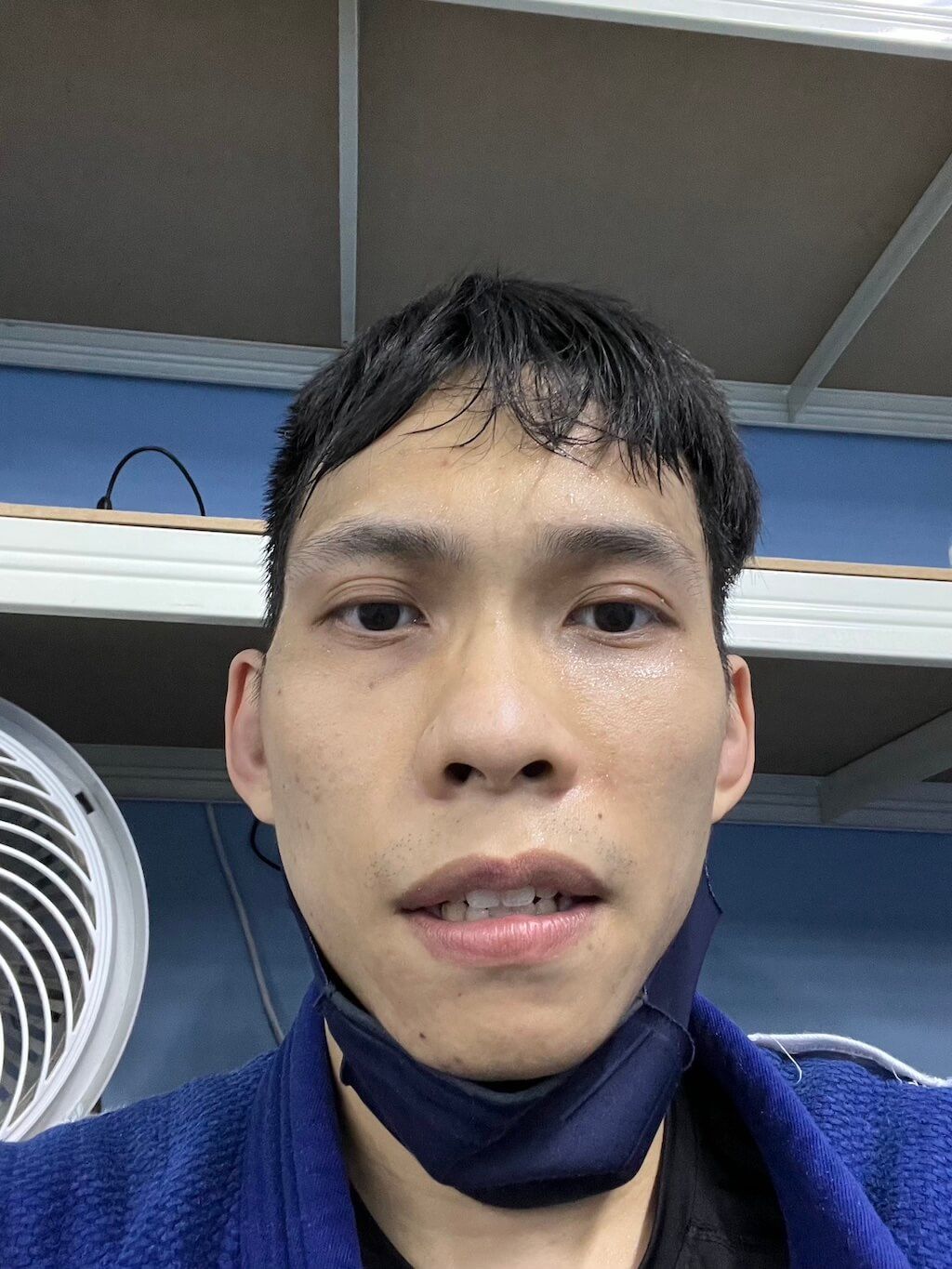
Footnotes
[1] My coach was incidentally in Rio covering that very World Championships as a media person for the International Judo Federation. He told me that everyone in the media room was screaming for a disqualification, since Ebinuma’s opponent did a very blatant and very illegal standing waki-gatame (armpit lock) not once, not twice, but three times. Ebinuma hid the fact that his arm was broken, and somehow managed to fight through the pain to throw his opponent. The crowd was outraged, the media folk were outraged, and the IJF video folk were flabbergasted as the match dragged on, so when Ebinuma finally scored, the stadium leapt to their feet in a standing ovation.
Originally published , last updated .
This article is part of the Expertise Acceleration topic cluster. Read more from this topic here→

